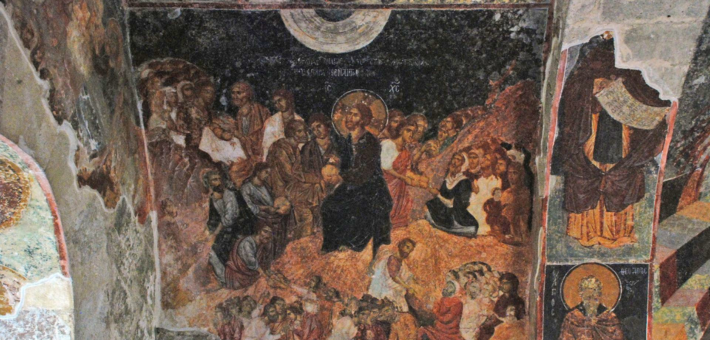Commentary on Romans 9:1-5
We find in this week’s epistle lesson a moment of tenderness. In the middle of his letter to the Romans, Paul pauses for a brief reprieve, a break from his theological thinking. In this pause we are invited to remember that relationships are messy. And we learn that this messiness greatly distresses Paul.
The heartbeat of Paul’s letter to the Romans is God’s relationship to both Jews and Gentiles. Up to this point, Paul has argued that both Jews and Gentiles exist in a broken relationship with God (Romans 1-3). But God, through the faith of Christ, sets out to reconcile both Jews and Gentiles to God and to teach each other.
Many contemporary Christians read Paul as replacing the Jewish community with Jesus-followers—Judaism with Christianity—and this passage has often served as a proof-text. But such readings are inadequate. Paul repeatedly reminds his readers that this is a Jewish story: “but glory and honor and peace for everyone who does good, the Jew first and also the Greek” (2:10-11).
Chapter and verse designations create a false division between the end of chapter 8 and the beginning of chapter 9. Paul makes a strong theological statement at the end of chapter 8. He writes: “For I am convinced that neither death, nor life, nor angels, nor rulers, nor things present, nor things to come, nor powers, nor height, nor depth, nor anything else in all creation, will be able to separate us from the Love of God in Christ Jesus our Lord” (8:38-39).
Instead of beginning a new section, it is possible to read verse 1 as continuing Paul’s message from chapter 8. Though it might shock some to hear such a bold claim about God’s love, he explains, “I am speaking the truth” and “my conscience confirms it” (verse 1). Paul is adamant—nothing can separate us from God.
The next two verses complicate things. Paul admits in the subsequent verse that he experiences great sorrow and has a relentless anguish in his heart (verse 2). But what brings about Paul’s grief? Many interpreters suggest a broken relationship with Israel, but this is not convincing. Paul refers to the Israelites as his brothers (adelphōn). Paul’s use of familial language to name them highlights their continued connection. It does not appear from this language that he feels any animosity towards the Jews or heartache from a separation.
Verse 3 is also tricky. It begins with an unclear acknowledgement of a past action. The NRSV translates, “For I could wish that I myself were accursed (anathema) and cut off from Christ for the sake of my own people, my kindred according to the flesh.” The verb translated here “could wish” is an imperfect verb. The use of the imperfect suggests that Paul is not indicating what he could do but what he used to do. Paul is not posing a possibility; he is describing a previous state of being.
This detail is important because it helps to reframe the wish or prayer. Paul is describing what he wished for previously. It is not something he currently longs for, nor is it a future request. So, what did Paul formerly desire? Scholars are divided.
Two factors lead to confusion about the translation of verse 3. First, we do not really know what the noun anathema means, and second, we do not know how Paul employs it. The noun has multiple meanings. It can refer to 1) an offering, 2) a curse, or 3) more generally, as something that is set apart. It is unclear how Paul is using the term in Romans.
Verse 3 is further complicated by interpretations. If Paul seeks separation, then we must ask, “from who?” From the Jews? From knowledge of Christ? Scholars pose a variety of answers. Some read Paul as suggesting he would give up his place in heaven for the Jews to believe in Jesus as the Messiah. But this reading does not make sense. Paul is clear that everyone receives God’s grace in the end (8:38-39).
Finally, verses 4 and 5 remind us that this is still a Jewish story. In Roman 3, Paul asks: “What advantage has the Jew?” Here he carefully curates a list. “They are Israelites, and to them belong the adoption, the glory, the covenants, the giving of the law, the worship, and the promises” (verse 4). Paul ends with a doxology. In a few short verses, he has moved from grief to praise.
At the end of this passage, there are two things we can know for sure: Paul is not anti-Judaism and something troubles him. Exactly what troubles Paul, however, is not clear. Paul is likely attempting to puzzle out what he does not fully understand himself—such as, what the finer details of this new relationship between God and creation are. In the end, I think that what we most gain from these few verses is a reminder that we often do not really know what Paul is saying. We are not privy to his inner thoughts or even what troubles his heart.
This week’s epistle reminds us that the work we are called to do is hard work and it often takes a toll on our relationships. Like Paul, it is good to name our emotions and the ways this makes us feel. Paul’s moment of vulnerability is a gift to pastors who similarly find themselves in a moment of sorrow or time of anguish. They are not alone. As Romans attests, Paul, too, is at times overcome with these feelings. He feels them in the depths of his heart.
This text from Paul’s letter to the Romans also reminds us that we do not have to have all the answers. Like Paul, we are in the process of figuring things out. Maybe we find ourselves in a position to say what we used to do. Paul’s vulnerability in this week’s passage demonstrates that what it looks like to be a Christian has been and always will be a process of negotiation.


August 6, 2023